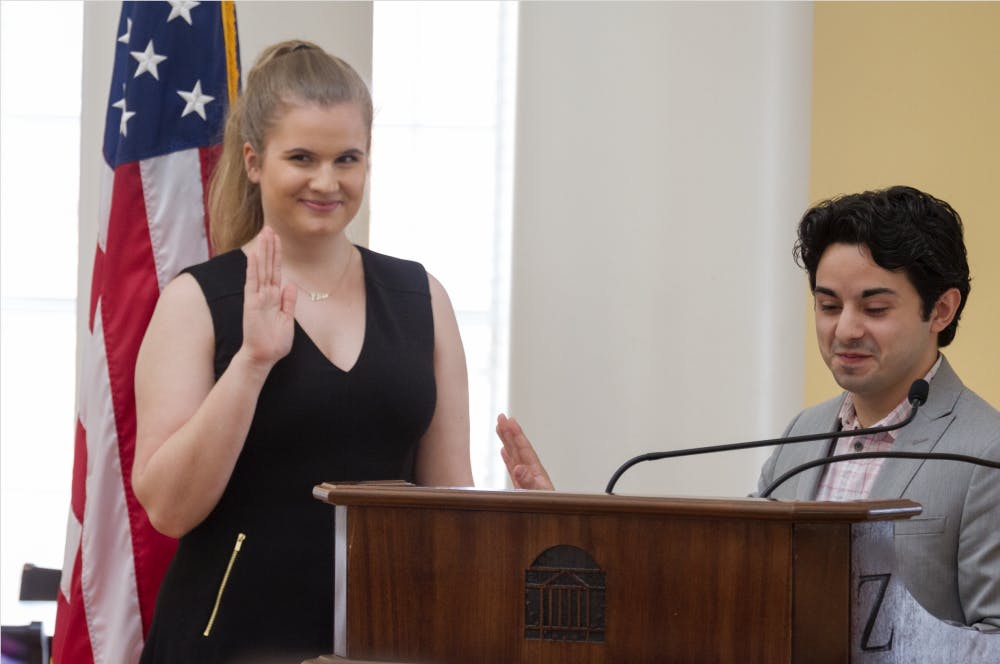Second-year College student Ellie Brasacchio will continue to serve as the chair of the Student Council Representative Body after being re-elected to the position Friday. Student Council will confirm Brasacchio’s re-election at its meeting Tuesday.
The central role of the chair of the Representative Body is to act as a liaison between members of the elected body and other Student Council officers. The chair also has the sole power to appoint officers and staff who are tasked with managing the affairs of the Representative Body. However, the chair is afforded the same voting privileges as other members of the body.
Brasacchio faced challenges for the position from two other representatives — second-year College student Allison Kammerman and third-year College student Brian Cameron.
The final vote count was not released at the meeting, which was held following a transition ceremony to swear in the recently-elected members of Student Council.
Each of the candidates was nominated to the position by a member the Representative Body and then delivered a speech discussing their platforms and goals for the office. Some fellow representatives also spoke in favor of the candidates.
After receiving a nomination from Avery Gagne, a first-year College student and representative, Brasacchio gave a prepared speech to the representatives in attendance and chose to highlight her goals from her time on Student Council.
“I am not running for the chair solely because of the things I’ve done, I am running for the things I want to do,” Brasacchio said. “I want to help guide you in the initiatives you have.”
Brasacchio cited her experience on Student Council, as both a representative and later the chair of the Representative Body, as a justification for her re-election. Brasacchio was first elected chair of the Representative Body last fall.
“I’ve seen a lot of chairs come and go,” Brasacchio said. “I know [the position] can be handled better.”
Brasacchio also emphasized specific issues she wishes to address in the next term, such as representative accountability and improving Student Financial Services.
“The miscommunication between students and the representatives is an issue,” Brasacchio said.
In order to improve student’s access to affordable education, Brasacchio argued that representatives should work to make Student Financial Services more available and accessible to students to allow for a simplified process for students to obtain financial aid.
“One of the main things of my platform is financial aid,” Brasacchio said. “I want to make sure all students have the same opportunities I did.”
Cameron challenged Brasacchio’s bid for re-election, centering his platform around the introduction of a new and outsider perspective to the Student Council. Cameron has not previously served on the Student Council but will begin his first term as a representative at the general body meeting Tuesday.
“I would like to emphasize the importance of fresh eyes,” Cameron said. “I want to make this whole organization more efficient at making policy.”
If elected chair of the Representative Body, Cameron said that he wanted to increase transparency between the Student Council Executive Board and the Representative Body, reduce excess Student Council spending on itself and directly reach out to student organizations to cooperate on various issues.
Kammerman discussed the importance of connecting members of the Representative Body with student constituents at the University, citing a bill passed by the Student Council in February requiring representatives to hold at least one office hour per week. Kammerman has served as a representative since her first year and argued that office hours are the best way to facilitate conversation between constituents and representatives.
“I think a great idea is representative office hours,” Kammerman said. “That is the easiest way to contact representatives.”
After the speeches by Brasacchio, Kammerman and Cameron, representatives in attendance were given the opportunity to ask the candidates questions. Questions ranged from issues concerning training of incoming representatives to experience with working with external organizations.
Gagne raised the matter of training Representatives to effectively author legislation for the candidates to discuss and added that each candidate intended to teach incoming Representatives how to draft bills.
Kammerman emphasized the importance on one-on-one instruction in terms of teaching representatives how to properly initiate and write legislation.
“I think working one on one with representatives is important,” Kammerman said.
Brasacchio and Cameron both talked about the usefulness of legislation workshops, a training method previously used by Student Council where incoming Representatives are taught how to draft bills.
“I would have a workshop in writing legislation,” Brasacchio said. “I think once you get your first and second bill down, you kind of get into your groove.”
Once the candidates finished addressing those in attendance, representatives privately cast their votes for one of the three candidates. After the votes were tallied, Alex Cintron, a third-year College student and Student Council president, announced Brasacchio’s victory in what he said was the most competitive election he had seen for chair of the Representative body.







